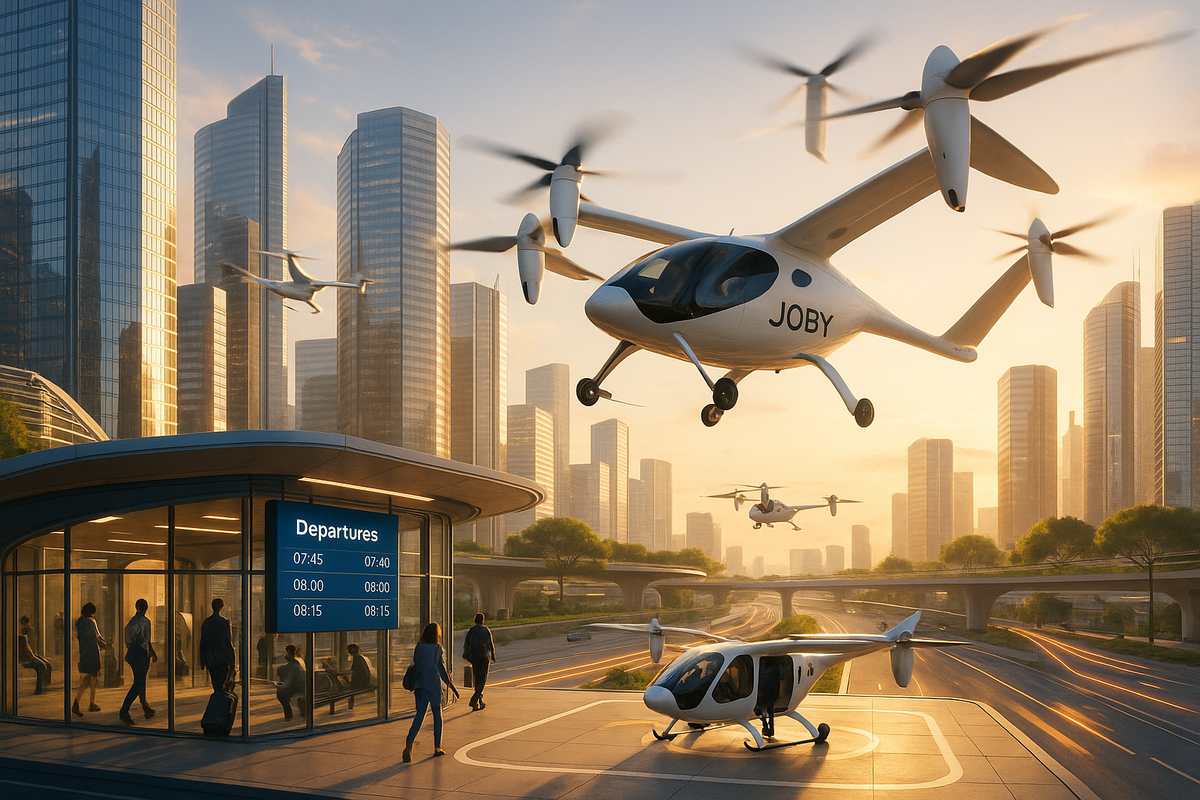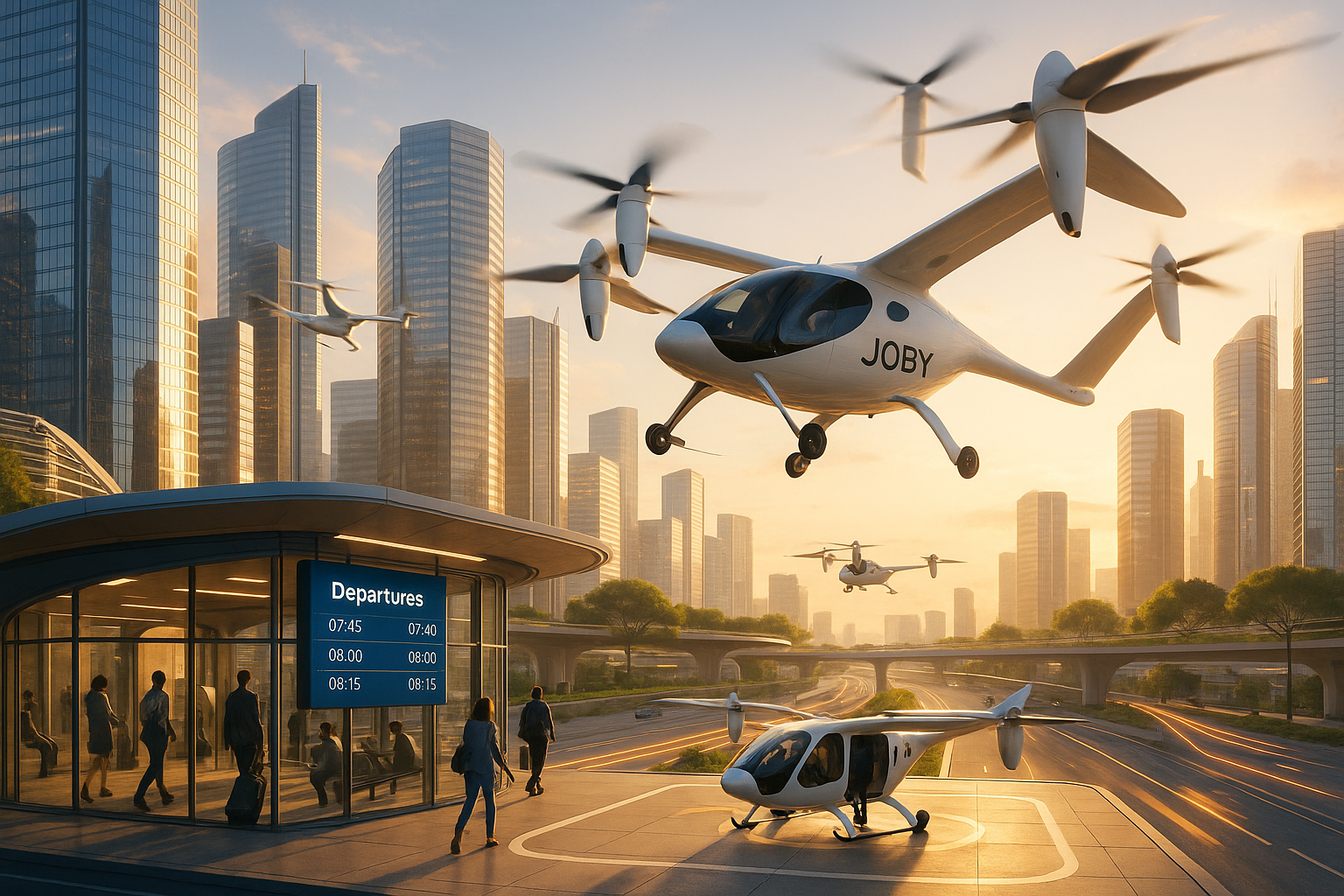Joby Aviation Soars Amidst eVTOL Hype, Signaling a New Era for Air Mobility


Joby Aviation (NYSE: JOBY) has recently experienced a significant surge in its stock value, fueled by a burgeoning "aviation buzz" surrounding the electric vertical takeoff and landing (eVTOL) aircraft market. This remarkable ascent, marked by substantial year-to-date and 12-month gains, positions Joby at the forefront of a potential revolution in urban and regional air travel. The immediate implications are profound, not only for Joby as it inches closer to commercial operations but also for the broader financial markets, which are increasingly recognizing the transformative potential of this nascent industry.
Joby's Ascent: Milestones Propel eVTOL Dream Closer to Reality
Joby Aviation's recent stock performance is a direct reflection of its tangible progress and strategic maneuvers within the eVTOL space. The company's shares have seen an impressive 82% increase in 2025 and a staggering 783% over the past 12 months, significantly outperforming both the US Airlines industry and the broader US market. This surge is underpinned by a series of critical operational milestones and strategic partnerships that are bringing the long-held dream of "flying cars" closer to reality.
Key achievements include surpassing 40,000 flight miles across its test fleet and successfully completing piloted flights that transition from vertical takeoff to cruise modes—a crucial step for FAA certification. Joby has also demonstrated dual-aircraft flight capability, showcasing its operational readiness for future urban air mobility services. A notable innovation is the 561-mile hydrogen-electric hybrid flight in June 2024, which signals Joby's ambition beyond urban air taxis into regional air travel. The company is making substantial headway towards securing FAA approval, having completed the third stage of the FAA-type certification process, a prerequisite for launching commercial operations. Furthermore, Joby is rapidly expanding its manufacturing capabilities, doubling its Marina, California, facility and planning a new plant in Dayton, Ohio, with a $500 million investment from Toyota (NYSE: TM), aiming for a production capacity of 500 units per year by 2027.
Adding to its momentum, Joby has forged strong alliances with industry giants such as Toyota, Uber Technologies (NYSE: UBER), and Delta Air Lines (NYSE: DAL). A significant strategic pivot involves a collaboration with L3Harris Technologies (NYSE: LHX) to develop gas turbine hybrid VTOL aircraft for defense missions. This partnership not only offers a path to near-term revenue through a $131 million Agility Prime contract but also provides long-term valuation upside. Flight testing for this new aircraft class is slated for fall 2025, with operational demonstrations in 2026. The "aviation buzz" is further amplified by the clear commercialization timeline, with Joby targeting initial operations in Dubai by early 2026, followed by a rollout in a U.S. city. This tangible roadmap, coupled with government support from a five-country alliance aimed at streamlining global eVTOL certification, instills confidence in the sector's future.
The High-Flyers and Grounded Contenders in the eVTOL Race
The burgeoning eVTOL market, spearheaded by Joby Aviation's (NYSE: JOBY) advancements, is creating a dynamic landscape of winners and losers among companies vying for a share of the future of air mobility. Joby's significant progress in FAA certification, strategic partnerships, and manufacturing expansion is setting a high bar, influencing the trajectory of its direct competitors and the broader aerospace ecosystem.
Among the clear winners are Joby's direct competitors who are also making substantial strides in development and certification. Archer Aviation (NYSE: ACHR), a prominent rival, is similarly progressing towards FAA certification for its Midnight aircraft and has secured partnerships with Stellantis (NYSE: STLA) and United Airlines (NASDAQ: UAL) for vertiport development. Beta Technologies, known for its cargo and logistics eVTOLs, is expanding its revenue potential through collaborations like that with United Therapeutics (NASDAQ: UTHR) for organ transportation, and is actively involved in developing crucial charging infrastructure. Wisk Aero, a joint venture between Boeing (NYSE: BA) and Kitty Hawk, is focusing on autonomous electric aircraft, leveraging Boeing's aerospace expertise. Eve Holding (NYSE: EVEX), a subsidiary of Embraer (NYSE: ERJ), is also developing eVTOLs with pre-orders and partnerships, benefiting from Embraer's established aerospace background. These companies, by demonstrating similar progress and securing strategic alliances, are poised to capitalize on the market validation and regulatory clarity that Joby's success brings.
Beyond direct competitors, the eVTOL boom is creating opportunities for a range of infrastructure and technology providers. Companies specializing in vertiport development, battery technology, advanced air traffic management systems, and composite material manufacturing are set to thrive as the industry scales. Traditional aerospace companies like Boeing and Textron Inc. (NYSE: TXT), through its Bell subsidiary, are also adapting by investing in or partnering with eVTOL ventures, leveraging their existing expertise and resources. Furthermore, logistics and emergency services companies that can integrate eVTOLs into their operations for cargo or specialized services stand to gain significant new revenue streams.
Conversely, the intense competition, high development costs, and stringent regulatory hurdles pose significant risks for many. Underfunded startups, unable to secure the substantial capital required for aircraft development and certification (which can exceed $1 billion per aircraft), are likely to face severe challenges. Companies experiencing significant delays in FAA or EASA certification processes will fall behind market leaders, losing competitive edge. The ability to scale production is also critical; those struggling with supply chain issues for composite materials or integrating advanced technologies will face setbacks. Public skepticism regarding noise concerns or safety, as well as companies relying solely on high-priced passenger services without significant convenience advantages, could also lead to financial instability. Companies without robust strategic partnerships with established aerospace firms, automotive leaders, or government entities may struggle to access necessary funding, expertise, and market channels, potentially leading to financial distress or even insolvency, as seen with challenges faced by companies like Volocopter and Lilium.
eVTOL's Ripple Effect: Reshaping Urban Landscapes and Regulatory Frameworks
Joby Aviation's (NYSE: JOBY) rapid progress and the broader development of the eVTOL market are not isolated events but rather integral components of a larger industry trend towards sustainable, efficient, and decongested urban mobility. This burgeoning sector is poised to reshape urban landscapes, redefine transportation paradigms, and necessitate significant shifts in regulatory frameworks, echoing historical precedents of disruptive technological advancements.
The eVTOL market's emergence aligns perfectly with the increasing global demand for solutions to urban traffic congestion and the urgent need for reduced carbon emissions. Joby's advancements, particularly in FAA certification, underscore the maturation of eVTOL technology and production processes. The FAA's classification of eVTOLs as "powered-lift" aircraft, a new category in nearly 80 years, signifies a monumental regulatory step forward for the entire industry. Strategic partnerships, such as Joby's collaborations with Delta Air Lines (NYSE: DAL) and Uber (NYSE: UBER), and its global expansion into the UK, Japan, and Dubai, highlight a broader industry trend of cross-sector collaboration between aerospace pioneers, automotive manufacturers, and ride-sharing platforms. This collaborative approach is crucial for mitigating operational risks and accelerating market entry, while also addressing the significant challenge of scaling manufacturing for cutting-edge eVTOL components like high-energy-density batteries and advanced composite materials.
The ripple effects of this transformation are far-reaching. Joby's advancements are intensifying competition, compelling rivals like Archer Aviation (NYSE: ACHR) and Beta Technologies to accelerate their own development and regulatory processes. This competitive environment is fostering rapid innovation in design, propulsion systems, and manufacturing techniques. The market is also likely to see further consolidation and strategic alliances as companies pool resources to overcome challenges like infrastructure development and production scaling. The demand for lightweight composite materials and advanced battery technology will drive innovation and expansion within the supply chain, creating new opportunities for manufacturers. Furthermore, the rise of eVTOLs will foster entirely new business models, particularly in urban air mobility services, cargo logistics, and emergency response, with ride-sharing platforms expected to play a significant role in their adoption.
From a regulatory and policy standpoint, the emergence of the eVTOL market necessitates the development of entirely new frameworks. Regulatory bodies like the FAA and EASA are actively crafting new rules and standards to address the unique characteristics of eVTOLs, including electric propulsion, autonomous capabilities, and urban airspace integration. This includes establishing airworthiness standards, pilot training and licensing, operational rules, and maintenance requirements. Certification remains a significant hurdle, as eVTOLs often incorporate novel technologies that don't fit existing categories, requiring regulators to develop performance-based standards and flexible certification pathways. Policies are also crucial for the development of vertiports and charging infrastructure, which demand substantial investment and grid upgrades. Integrating eVTOLs into existing airspace requires new rules for low-altitude operations and the creation of Unmanned Traffic Management (UTM) systems to manage high-density air traffic. Crucially, regulatory bodies and companies must address public concerns regarding noise pollution, perceived safety, and environmental impact to gain widespread support and ensure harmonized global regulations for widespread adoption.
Historically, the rise of the eVTOL market draws parallels to other disruptive technologies in transportation. Much like the early days of aviation, where the Wright brothers' invention paved the way for commercial flight, eVTOLs represent a fundamental shift in how people and goods can be transported. The initial development of aviation was heavily influenced by government investment, a trend echoed in the current eVTOL landscape with government support and initiatives playing a crucial role in infrastructure and regulation. The introduction of automobiles similarly revolutionized personal transportation, leading to the development of extensive road networks and new industries. eVTOLs could similarly transform urban landscapes and create new economic opportunities in manufacturing, maintenance, and operations. The transition to the jet age in civil air transport in the 1950s, despite initial challenges, led to faster and more efficient long-distance travel; eVTOLs promise a similar leap in efficiency for shorter, urban distances. Like all disruptive technologies, the success of eVTOLs hinges on addressing safety concerns, cost, and public perception, ultimately challenging existing paradigms and demanding new infrastructure, regulations, and societal acceptance.
What Comes Next: Navigating the Skies of Opportunity and Challenge
The trajectory of Joby Aviation (NYSE: JOBY) and the broader eVTOL market is poised for significant transformation in the coming years, marked by both immense opportunities and formidable challenges. The short-term focus for Joby revolves around achieving full certification, scaling production, and initiating commercial operations, while the long-term vision encompasses widespread adoption and diversification of applications.
In the short term (1-3 years), Joby is intensely focused on completing its FAA certification, having made substantial progress in Stage 4 requirements and anticipating Type Inspection Authorization (TIA) flight testing within the next year. This puts them ahead of many competitors. The company plans to deliver an aircraft to Dubai by mid-2025 for flight testing, with commercial launch slated for 2026, where Joby holds exclusive six-year operating rights. Initial U.S. operations are also expected around 2026-2027. Concurrently, Joby is rapidly expanding its manufacturing capabilities, doubling its Marina, California, facility and ramping up its Dayton, Ohio, plant with support from Toyota (NYSE: TM), aiming for an eventual capacity of 500 aircraft annually. A significant strategic pivot in the short term is Joby's collaboration with L3Harris Technologies (NYSE: LHX) to develop gas turbine hybrid VTOL aircraft for defense applications. This partnership offers a potentially faster path to revenue and higher margins compared to commercial urban air mobility (UAM), with flight testing for the hybrid aircraft planned for fall 2025 and demonstrations in 2026. Joby's strong financial position, with substantial cash reserves, provides a crucial buffer for these scaling efforts.
Looking further ahead (beyond 3 years), the long-term possibilities for Joby and the eVTOL market are vast. The urban air mobility market is projected for substantial growth, with some analysts forecasting it to reach $280 billion in passenger revenue by 2045 and the overall eVTOL market potentially reaching $1.5 trillion by 2040. Joby's early-mover advantage, regulatory progress, and strong partnerships position it to capture a significant share of this emerging market. Beyond initial urban air taxi services, the long-term outlook includes diverse applications such as regional transportation, cargo delivery, emergency services, and military applications. The development of a hydrogen-electric variant, which has demonstrated a threefold increase in range, could unlock new market opportunities beyond initial urban mobility. Continued advancements in battery technology, including solid-state and sodium-ion batteries, are crucial for enhancing eVTOL performance, safety, and sustainability, leading to longer flight durations and increased payload capacity. Global harmonization of certification standards, through initiatives like the NAA Network, will also reduce friction for international deployment.
However, the nascent nature of the eVTOL market necessitates continuous strategic adaptation. Regulatory navigation remains a key challenge, requiring close collaboration with bodies like the FAA to establish clear and consistent rules for air traffic management and operations. The lack of widespread infrastructure, particularly vertiports and charging stations, is a significant constraint, demanding active participation and investment from Joby and other players. Achieving economic viability is paramount, as the high costs of development, certification, and production mean initial services may be considered a luxury. Scaling production and technological advancements will be crucial to reduce costs and make eVTOL services competitive. Public acceptance is another critical factor, requiring effective strategies to address concerns regarding safety, noise, and privacy. Diversification of revenue streams, as exemplified by Joby's defense pivot, is a smart strategic move to mitigate risks and leverage technology in markets with potentially faster commercialization.
Market opportunities abound in urban congestion relief, environmental benefits through reduced emissions, and the creation of entirely new markets in urban and regional air mobility. The industry is also expected to generate new jobs and drive technological innovation in battery technology and propulsion systems. Nevertheless, significant challenges persist, including complex certification hurdles, the infrastructure gap, high development costs, and the need for advanced air traffic management systems. Pilot availability, public acceptance, intense competition, and cybersecurity concerns also present formidable obstacles. Potential scenarios range from rapid adoption, where Joby successfully navigates challenges and the market experiences exponential growth, to a more moderate, phased rollout, or even a challenging scenario with slow adoption due to persistent hurdles. Joby Aviation is well-positioned as a frontrunner, but its ultimate success, and that of the broader eVTOL market, hinges on effectively addressing these complexities, building out essential infrastructure, achieving economic viability, and gaining widespread public acceptance.
Conclusion: Charting a Course for the Future of Flight
Joby Aviation's (NYSE: JOBY) recent surge in market value, fueled by significant operational milestones and strategic partnerships, underscores a pivotal moment in the evolution of air mobility. The "aviation buzz" surrounding eVTOL technology is not merely speculative; it reflects tangible progress towards a future where urban and regional air travel is transformed. Key takeaways from this event highlight Joby's leadership in FAA certification, its aggressive manufacturing expansion, and its astute diversification into the defense sector, all of which position it as a frontrunner in a highly competitive and capital-intensive industry.
Moving forward, the market will be closely watching Joby's ability to translate its testing successes into certified commercial operations and to scale production efficiently. The company's strategic alliances with industry giants like Toyota (NYSE: TM), Uber (NYSE: UBER), and Delta Air Lines (NYSE: DAL), coupled with its defense contracts, provide a robust foundation for navigating the complex path to commercialization. However, investors should remain cognizant of the inherent risks associated with a nascent industry, including regulatory hurdles, the need for extensive infrastructure development, and the challenge of achieving widespread public acceptance.
The lasting impact of Joby's progress extends beyond its own valuation, serving as a powerful validation for the entire eVTOL market. It encourages further investment, accelerates regulatory development, and pushes the boundaries of electric aviation. As the industry matures, we can expect continued innovation, strategic consolidations, and the emergence of new business models. Investors should closely monitor Joby's progress in securing final FAA certification, the pace of its manufacturing ramp-up, and the successful launch of its initial commercial services in Dubai and the U.S. The ability of Joby and its competitors to address the critical challenges of infrastructure, cost-effectiveness, and public perception will ultimately determine the speed and scale of the eVTOL revolution, charting a new course for the future of flight.



